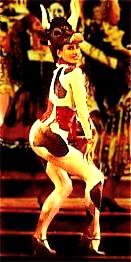

The first operatic solo of the evening (“La speranza” from Semiramide) goes to Juan Diego Florez. Further highlights of the first half include a duet from L’italiana in Algeri (Ildar Abdrazakov, Olga Borodina), “O mio babbino caro” (Ruth Anne Swenson), “Una furtiva lagrima” (Ramon Vargas), “Ah non credea mirarti” (Natalie Dessay), the Count’s aria from Figaro (Dwayne Croft), “Can’t Help Lovin’ Dat Man” (Denyce Graves), “Tacea la notte” (Renee Fleming [!]), “Je vais mourir” from Les Troyens (Waltraud Meier), the Prize Song (Ben Heppner), and Marietta’s Lied (Kiri te Kanawa[!!]).
Frederica von Stade, Salvatore Licitra and Domingo (who sings, too!) will also perform a few songs in this segment, and after a “gala film” is shown, la Voigt will return to perform “Pace, pace.”
Susan Graham is first on after intermission with another Moore ditty, followed by Stephanie Blythe (“Ah, que j’aimes les militaires”), Thomas Hampson (Pierrot’s song from Die Tote Stadt), Samuel Ramey (Mephisto’s serenade from Faust), Dimitri Hvorostovsky and Rene Pape in arias from Don Carlo, and the double-barrelled mezzo excitement of Dolora Zajick‘s “O mon Fernand” and Ms. Meier’s Easter Hymn from Cavalleria.
Two numbers from Così fan tutte follow: “Ah guarda sorella” with Mmes. von Stade and te Kanawa, and “Soave sia il vento” with Fleming, Graham and Hampson. The baritone returns with Karita Mattila for selections from The Merry Widow, and then the audience will take a well-deserved bathroom break while the Met Ballet performs a jolly polka. (UPDATE: further clues suggest that this number will accompany an “open” scene change, so the audience will finally learn the meaning of all that yelling and banging that goes on while we sit in semidarkness for ten minutes at a stretch. It’s important that we see this now, because that spoilsport Peter Gelb has vowed to use some sort of voodoo “technology” to facilitate instantaneous scene changes, the way they do on Broadway, at the NYCO, in every European opera house, and, well, basically everywhere in the universe besides the Met.)
James Morris will then lead the Gods into Valhalla, and Susan Graham will bid us all farewell with “Parto, parto.” But wait, the show’s not over yet. In what might best be called the “TBA Segment,” we will (or perhaps will not) hear tenors Roberto Alagna and Marcello Giordani in arias from Cyrano de Bergerac and La gioconda respectively. The legendary Mirella Freni is penciled in for an aria from Alfano’s Risurezzione and a Puccini song, and then comes an item listed merely as “(34. L. Pavarotti).”
Returning to the scheduled program, Mattila, Heppner, Pape, Morris (and Matthew Polenzani) bring the curtain down with the finale to Fidelio under the baton of Maestro Schneider. At this point, La Cieca assumes, Rudy Giuliani will present Volpe with a plaque or something and perhaps make a joke about how he’s expecting Joe to be on time for work. And then The Beautiful Voice will be heard once more asking the musical question “When I Have Sung My Songs.”

























Comments